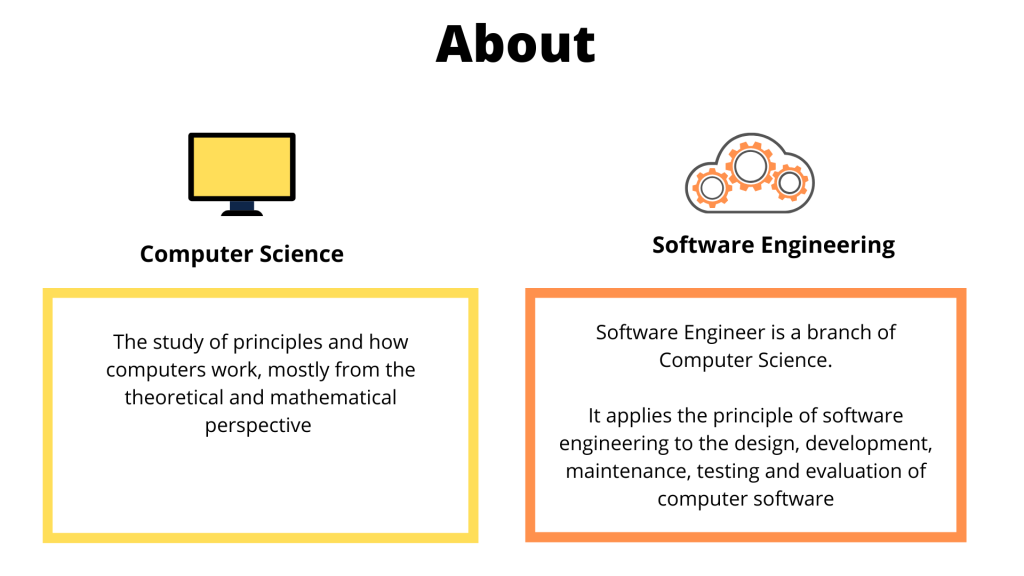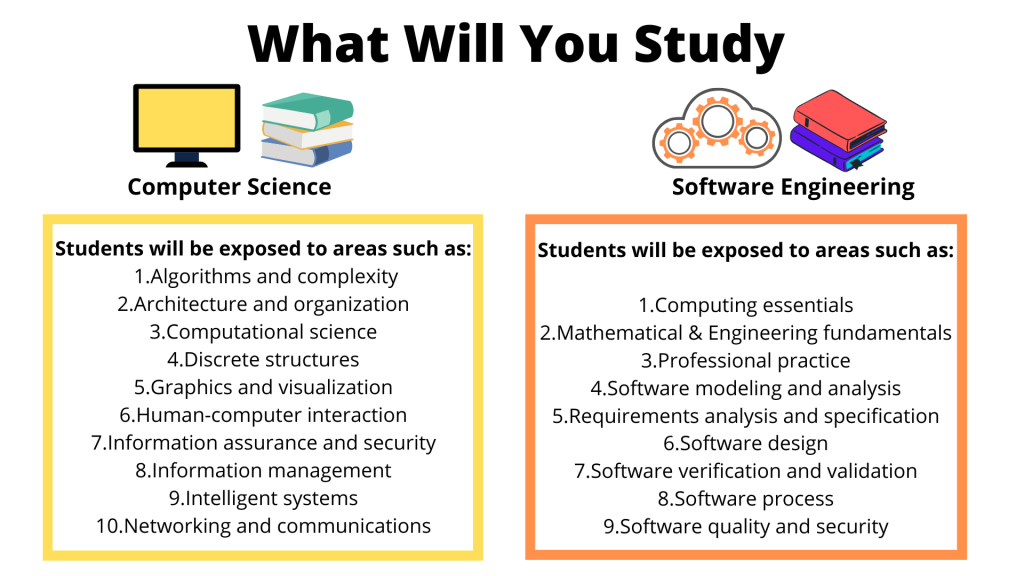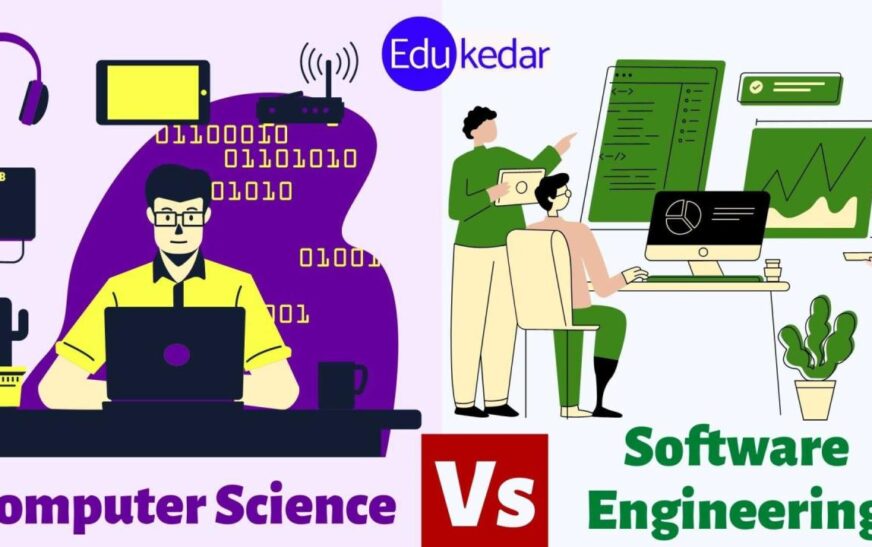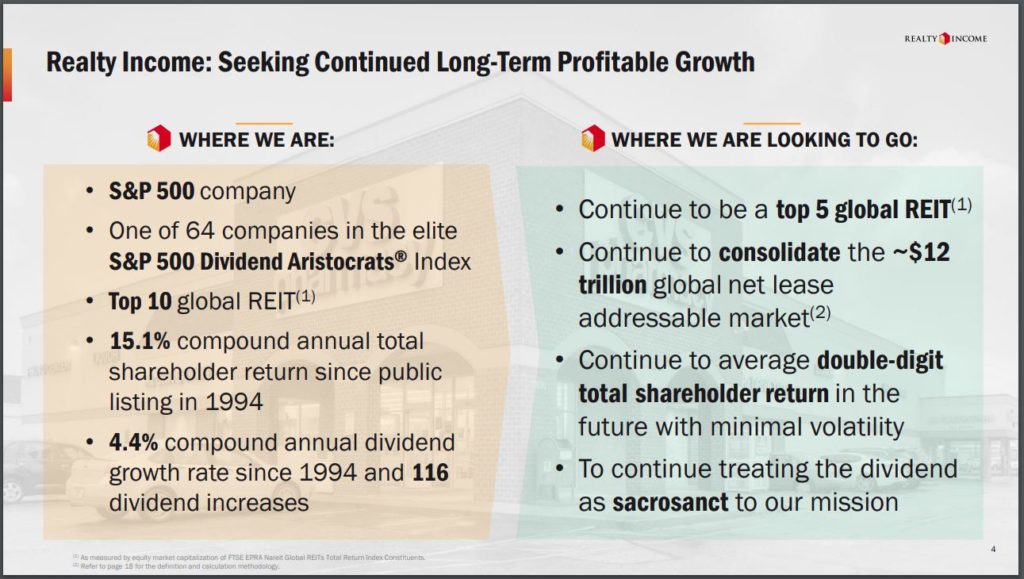Software engineering vs computer science sets the stage for this enthralling narrative, offering readers a glimpse into a story that is rich in detail and brimming with originality from the outset. As we delve into the world of technology, we uncover the distinct paths and applications of these two closely related fields that shape our digital landscape.
Overview of Software Engineering and Computer Science

Software engineering involves the application of engineering principles to the design, development, maintenance, testing, and evaluation of software systems. On the other hand, computer science focuses on the theoretical foundations of computation and information, as well as the practical techniques for their application.
Main Differences between Software Engineering and Computer Science
- Software Engineering: Involves the systematic approach to software development, including requirements analysis, design, implementation, testing, and maintenance.
- Computer Science: Focuses on the theoretical aspects of algorithms, data structures, programming languages, and computational theory.
- Software Engineering: Emphasizes the software development process and project management techniques to deliver high-quality software products.
- Computer Science: Concentrates on the mathematical and theoretical aspects of computing, including algorithm analysis and optimization.
- Software Engineering: Addresses the practical concerns of developing software that meets specific user needs and business requirements.
- Computer Science: Explores the foundational principles of computing and information processing, enabling the development of new technologies and advancements.
Examples of Applications in Real-world Scenarios
- Software Engineering: Developing mobile applications for smartphones to provide users with personalized experiences and efficient functionalities.
- Computer Science: Creating algorithms for optimizing search engine results to deliver relevant information to users based on their queries.
- Software Engineering: Designing and implementing e-commerce platforms to enable online transactions and secure payment processing.
- Computer Science: Researching artificial intelligence and machine learning algorithms to improve autonomous vehicle navigation systems.
- Software Engineering: Building and maintaining large-scale databases for storing and retrieving data in enterprise systems.
- Computer Science: Investigating cybersecurity measures and encryption techniques to protect sensitive information from unauthorized access.
Educational Requirements and Curriculum
When it comes to educational requirements, both software engineering and computer science programs typically require a strong background in mathematics, logic, and problem-solving skills. However, there are some differences in the specific courses and curriculum offered.
Software Engineering Program
A software engineering program often includes courses that focus on the design, development, and maintenance of software systems. Some typical courses you may find in a software engineering curriculum include:
- Software Design and Architecture
- Software Testing and Quality Assurance
- Project Management for Software Development
- Database Management Systems
- Web Development
- Software Maintenance and Evolution
Computer Science Curriculum
A computer science curriculum, on the other hand, covers a broader range of topics related to computing and technology. Some core courses you can expect to take in a computer science program include:
- Introduction to Computer Science
- Data Structures and Algorithms
- Operating Systems
- Computer Networks
- Artificial Intelligence
- Computer Architecture
Skills and Tools
Software engineers and computer scientists require a distinct set of skills and tools to excel in their respective fields. Let's explore the key skills needed for software engineers, the essential tools they use, and compare the technical skills required for computer scientists.
Key Skills for Software Engineers
Software engineers need a combination of technical and soft skills to succeed in their roles. Some of the key skills required include:
- Proficiency in programming languages such as Java, Python, C++, or JavaScript.
- Strong problem-solving abilities to identify and solve complex technical issues.
- Knowledge of software development methodologies like Agile or Scrum.
- Excellent communication skills to collaborate with team members and stakeholders.
- Attention to detail to ensure the quality and reliability of software products.
Essential Tools for Software Engineers
Software engineers rely on various tools to streamline their development process and enhance productivity. Some essential tools used by software engineers include:
- Integrated Development Environments (IDEs) such as Visual Studio Code, IntelliJ IDEA, or Eclipse.
- Version control systems like Git for managing code changes and collaboration.
- Testing frameworks such as JUnit or Selenium for automated testing of software applications.
- Project management tools like Jira or Trello to track progress and organize tasks.
- Database management systems like MySQL or PostgreSQL for storing and retrieving data.
Technical Skills for Computer Scientists
Computer scientists require a strong foundation in theoretical and technical concepts to innovate and solve complex problems in computing. Some of the technical skills needed for computer scientists include:
- Algorithm design and analysis to develop efficient solutions to computational problems.
- Data structures knowledge to organize and manage large datasets effectively.
- Understanding of computer architecture and operating systems to optimize system performance.
- Proficiency in programming languages like C, C++, Java, or Python for software development.
- Mathematical skills for modeling and analyzing algorithms and systems.
Career Paths and Opportunities

When it comes to career paths and opportunities, both software engineering and computer science offer a wide range of options for professionals to explore. Let's take a closer look at the different paths available in these fields, the job prospects, and salary ranges.
Career Paths for Software Engineers
Software engineers have the opportunity to specialize in various areas such as:
- Software Developer
- Quality Assurance Engineer
- Systems Architect
- DevOps Engineer
Career Paths for Computer Scientists
Computer scientists can pursue careers in diverse fields like:
- Data Scientist
- Machine Learning Engineer
- Information Security Analyst
- Network Architect
Job Prospects and Opportunities
Both software engineers and computer scientists are in high demand across industries, with opportunities in tech companies, government agencies, healthcare, finance, and more. The need for skilled professionals in these fields continues to grow as technology advances.
Salary Ranges Comparison
While salary ranges can vary based on factors like experience, location, and company size, software engineers tend to earn slightly higher salaries compared to computer scientists. According to the U.S. Bureau of Labor Statistics, the median annual wage for software developers in 2020 was $110,140, while computer and information research scientists earned a median salary of $126,830.
Industry Trends and Innovations
In the fast-paced world of technology, both software engineering and computer science are constantly evolving to meet the demands of the industry. Let's explore some of the latest trends and innovations shaping these fields.
Agile Methodologies in Software Engineering
Agile methodologies have gained popularity in software development due to their emphasis on collaboration, adaptability, and iterative development. This approach allows teams to respond quickly to changing requirements and deliver high-quality software efficiently.
DevOps Integration
DevOps practices have become essential in the software development lifecycle, bridging the gap between development and operations teams. By automating processes, improving communication, and promoting continuous integration and delivery, DevOps accelerates the development and deployment of software products.
Artificial Intelligence in Computer Science
Artificial intelligence (AI) is transforming the field of computer science by enabling machines to perform tasks that typically require human intelligence. From natural language processing to computer vision, AI applications are revolutionizing industries such as healthcare, finance, and automotive.
Blockchain Technology
Blockchain technology, known for its secure and transparent distributed ledger system, is disrupting various sectors beyond cryptocurrency. In computer science, blockchain is used for creating decentralized applications, smart contracts, and enhancing data security and privacy.
Closing Summary

In conclusion, the comparison between software engineering and computer science reveals not only the differences in educational paths and skills but also the diverse career opportunities and evolving trends in the tech industry. As technology continues to advance, the demand for skilled professionals in both disciplines remains high, paving the way for innovation and growth in this dynamic field.
FAQ Summary
What is the main difference between software engineering and computer science?
Software engineering focuses on the systematic development of software solutions, while computer science deals with the theoretical foundations of computing and information processing.
What are the key skills required for a software engineer?
Key skills for software engineers include programming languages, problem-solving abilities, teamwork, and project management.
What are the typical courses included in a software engineering program?
Typical courses in software engineering programs cover software design, algorithms, data structures, and software testing.
What are the career prospects for computer scientists?
Computer scientists have diverse career paths in areas such as software development, data analysis, artificial intelligence, and cybersecurity.
How are software engineering and computer science evolving with technology?
Both fields are adapting to emerging technologies like AI, blockchain, and DevOps, shaping the future of software development and computational research.





